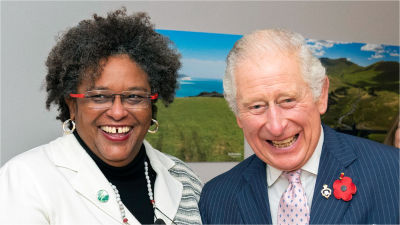Prince Charles to witness moment Barbados becomes a Republic

Prince Charles has accepted an invitation to be in Barbados this month at the moment it drops the Queen as Head of State and becomes a Republic. The country’s Prime Minister Mia Mottley, who has pushed through the change in her nation’s constitutional status, has invited him to be there. The day Barbados becomes a republic will coincide with its 55th anniversary of independence from Britain.
Listen to the latest episode of the Royal Rota podcast
But, in November 1966, this Caribbean country retained the Queen as its Head of State and has been one of the Queen's Realms every since. There are 15 Commonwealth countries in addition to the UK where the Queen remains their Sovereign - including Canada, Australia, New Zealand and Grenada. But from December 1 this year, there will be 14. Barbados is the first country to drop the Queen as Head of State since Mauritius in 1992 and the first Caribbean country since Trinidad & Tobago in 1976.
Barbados sees the move as completing the unfinished business of independence but many will also argue it's evidence of the Royal Family's dwindling relevance in many parts of the world. Barbados will remain in the Commonwealth - which now has 54 member countries. By extending an invitation to the Prince of Wales, the prime minister of Barbados is trying to show the transition to a Republic is not a snub to the Queen or the Royal Family. Prime Minister Mottley wants to use the moment to put Barbados on the world stage as a leading voice for small island nations – especially in the fight against climate change. She has made two powerful speeches on the world stage in recent weeks - one at the United Nations Secretary General Assembly and the other at the COP26 climate change summit in Glasgow. The current Governor General Dame Sandra Mason - who is currently the Queen's appointed representative - will become the first President of Barbados – and more widespread changes to the constitution happen next year. The transition to a republic by Barbados might also revive the debate about Britain's colonial past and whether or not the UK should pay reparations for what it did in its colonies during the era of the British Empire.